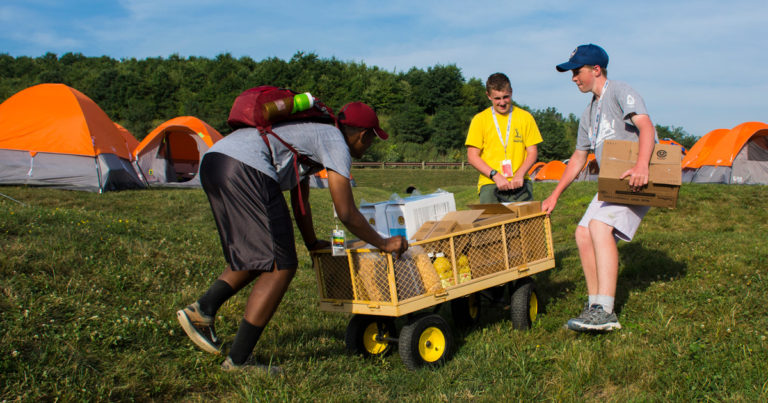Waste not: 2017 National Jamboree was the greenest on record

 Anyone who attended the 2017 National Jamboree already knows it was one of the most successful Jamborees ever.
Anyone who attended the 2017 National Jamboree already knows it was one of the most successful Jamborees ever.
Now we know it was likely the greenest Jamboree ever, too.
For the first time in recorded National Jamboree history, Scouts, Scouters and staff recycled and reused more than they sent to the landfill.
At the 2017 National Jamboree, held in July at the Summit Bechtel Reserve in West Virginia, some 298 tons — 596,000 pounds — of material was recycled or reused. That exceeds the 280 tons of waste sent to the landfill.
Here’s how that compares to the two previous Jamborees:
| Jamboree | Tons recycled/reused | Tons to landfill |
| 2017 | 298 | 280 |
| 2013 | 192 | 492 |
| 2010 | 64 | 1,125 |
What about National Jamborees before 2010? That data isn’t available, as 2010 was the first time recycling numbers were tracked.
We do know the 2017 Jamboree introduced new efforts to increase recycling and decrease food waste. It’s hard to imagine earlier Jamborees beating 2017’s impressive achievement.
Green Team, go!
You can call them the Green Team, or you can call them Recycle Rangers. Either way, these Jamboree volunteers were instrumental in encouraging recycling at the 2017 event.
The Green Team trained Jamboree participants and staffers, telling them what to recycle and reuse and what was OK to toss.
Jim Miles, Green Team leader, said Scouts eagerly accepted the mission.
“This all happened because, as members of the BSA, we have always cared deeply about our environment,” he said. “When given an opportunity at the Jamboree, we proved we will all pitch in to do our part.”
Food savers
For 2017, the Jamboree moved to a grocery store food system where Scouts and Venturers selected a recipe, built a shopping list and checked out — all through a smartphone app.
This grocery store method helped reduce food waste.
Scouts didn’t “buy” anything they didn’t want. And any food that wasn’t “bought” by Scouts, including perishable food, never left the grocery stores’ refrigerators. That made it possible to donate that unexpired food to local food banks — instead of some of it going into trash as it did in 2013.
More than 160 tons of food was donated to local food banks during the 2017 Jamboree. That’s more than double the 63 tons of donated food in 2013.
Miles hopes these habits of wasting less and recycling more weren’t limited to 10 days in July.
“Our greatest hope is participants will take home what they learned and implement it in their homes and communities and local Scout camps,” he said.
More Jamboree coverage
You can read all our coverage from the 2017 National Jamboree right here.
Photo: BSA Photo by Todd Punch
Waste not: 2017 National Jamboree was the greenest on record
